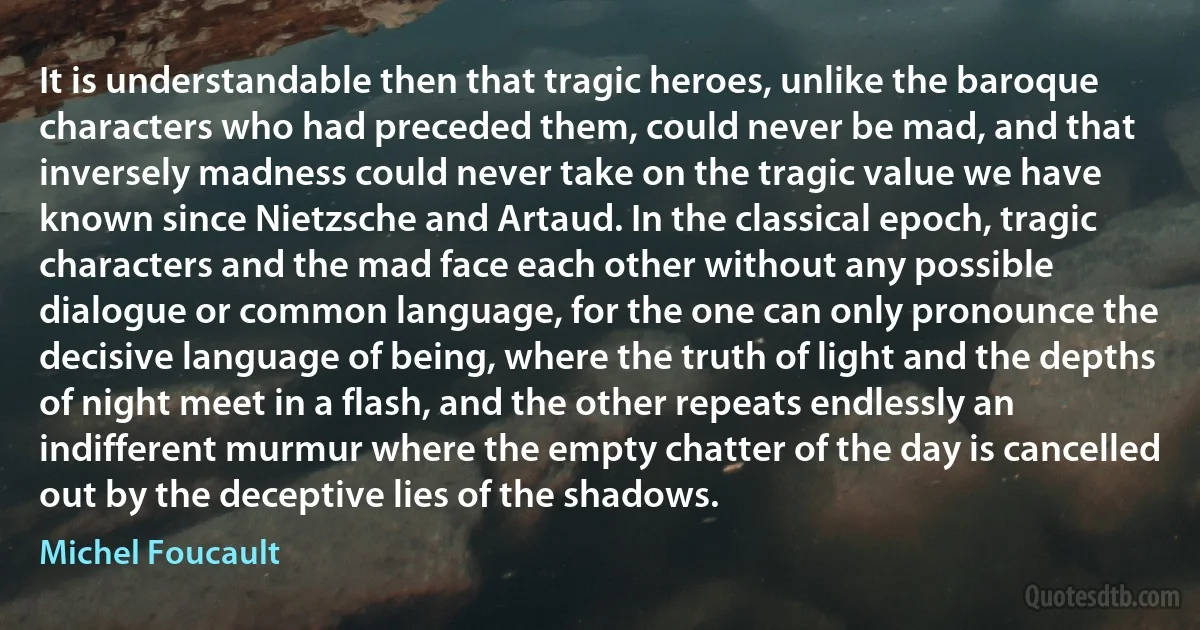
It is understandable then that tragic heroes, unlike the baroque characters who had preceded them, could never be mad, and that inversely madness could never take on the tragic value we have known since Nietzsche and Artaud. In the classical epoch, tragic characters and the mad face each other without any possible dialogue or common language, for the one can only pronounce the decisive language of being, where the truth of light and the depths of night meet in a flash, and the other repeats endlessly an indifferent murmur where the empty chatter of the day is cancelled out by the deceptive lies of the shadows.
Michel FoucaultRelated topics
baroque classical common day empty epoch face hero known language light mad madness meet murmur night possible pronounce take truth value Nietzsche liesRelated quotes
This possibility, of always drawing from the pristine fount of our own nature, that makes us feel ourselves no more a race, no mere variety of man, but one of Manhood's primal branches, - 'tis this that ever has bestowed on us great men and spiritual heroes, as to whom we have no need to trouble whether fashioners of foreign fatherless civilisations are able to understand and prize them; whilst we again, inspired by the deeds and gifts of our forefathers, and gazing with unclouded eye, are able to rightly estimate those foreigners, and value them according to the spirit of pure Humanity indwelling in their work.

Richard Wagner
Religion translates metaphysical or universal truths into dogmatic language; now though dogma is not accessible to all men in its intrinsic truth, which can only be directly attained by the Intellect, it is nonetheless accessible through faith, which is, for the great majority, the only possible mode of participation in the Divine Truths. As for intellectual knowledge, which proceeds neither from belief nor from a process of reasoning, it goes beyond dogma in the sense that, without ever contradicting the latter, it penetrates its internal dimension, that is, the infinite Truth that dominates all forms.

Frithjof Schuon
Day was breaking on the world. Light, hope, and freedom pierced with vitalizing ray the clouds and the miasma that hung so thick over the prostrate Middle Age, once noble and mighty, now a foul image of decay and death. Kindled with new life, the nations gave birth to a progeny of heroes, and the stormy glories of the sixteenth century rose on awakened Europe. But Spain was the citadel of darkness,-a monastic cell, an inquisitorial dungeon, where no ray could pierce. She was the bulwark of the Church, against whose adamantine wall the waves of innovation beat in vain.

Francis Parkman
[Nietzsche inveighs] against every sort of historical optimism; but he energetically repudiates the ordinary pessimism, which is the result of degenerate or enfeebled instincts of decadence. He preaches with youthful enthusiasm the triumph of a tragic culture, introduced by an intrepid rising generation, in which the spirit of ancient Greece might be born again. He rejects the pessimism of Schopenhauer, for he already abhors all renunciation; but he seeks a pessimism of healthiness, one derived from strength, from exuberant power, and he believes he has found it in the Greeks.

Georg Brandes
When we seek a textbook case for the proper operation of science, the correction of certain error offers far more promise than the establishment of probable truth. Confirmed hunches, of course, are more upbeat than discredited hypotheses. Since the worst traditions of "popular” writing falsely equate instruction with sweetness and light, our promotional literature abounds with insipid tales in the heroic mode, although tough stories of disappointment and loss give deeper insight into a methodology that the celebrated philosopher Karl Popper once labeled as "conjecture and refutation.”.

Stephen Jay Gould
